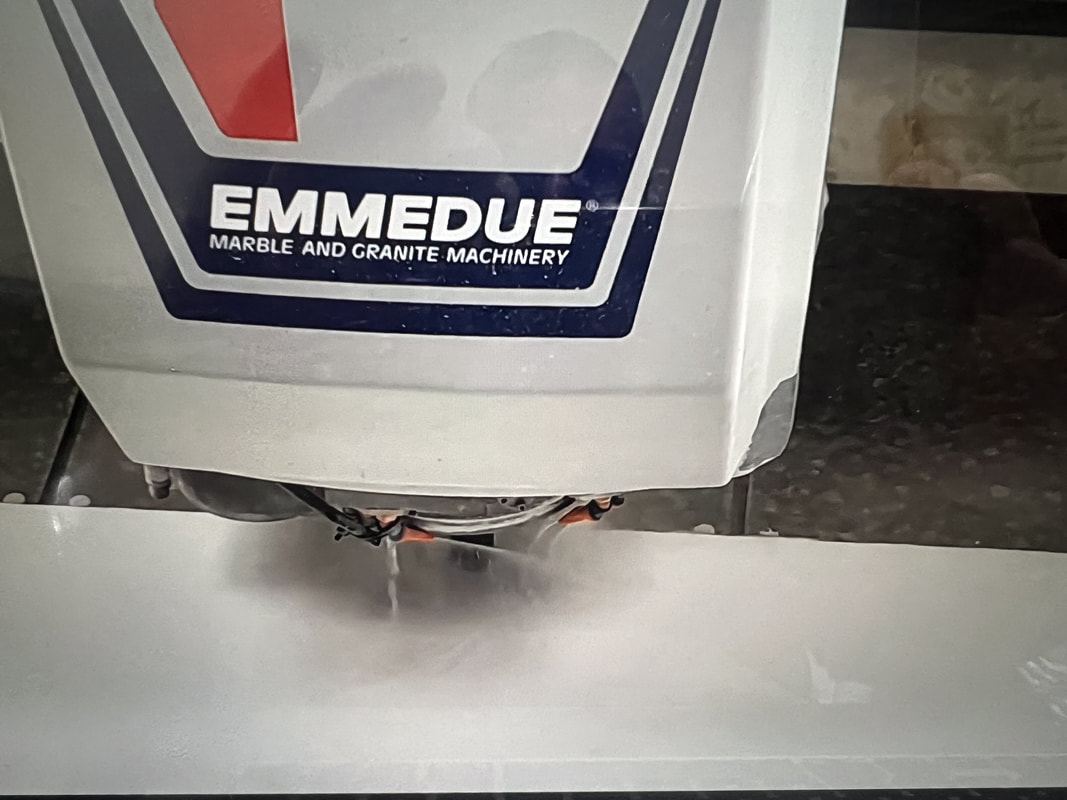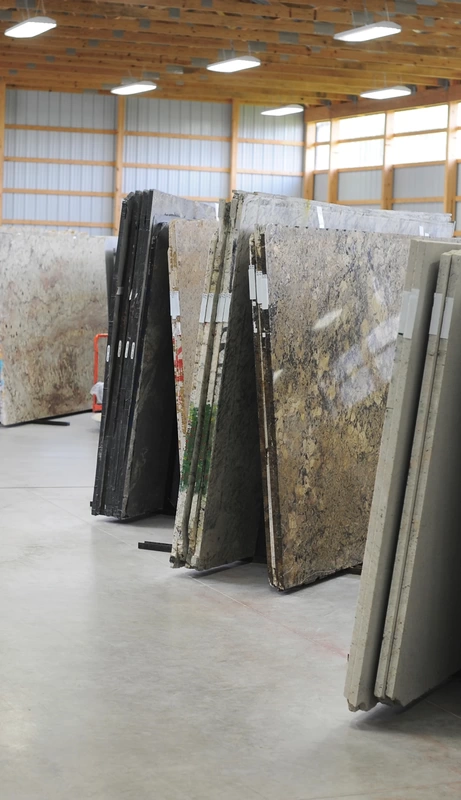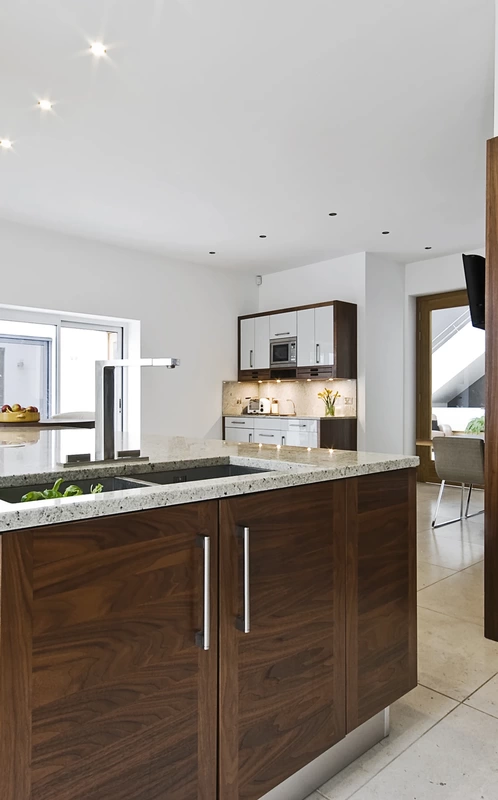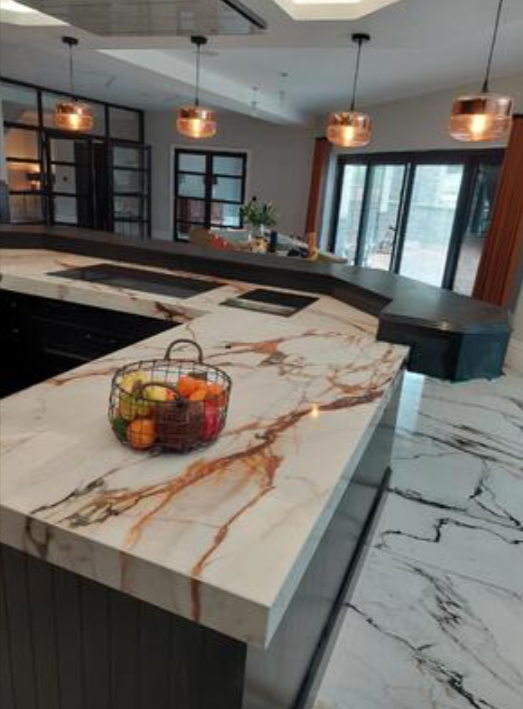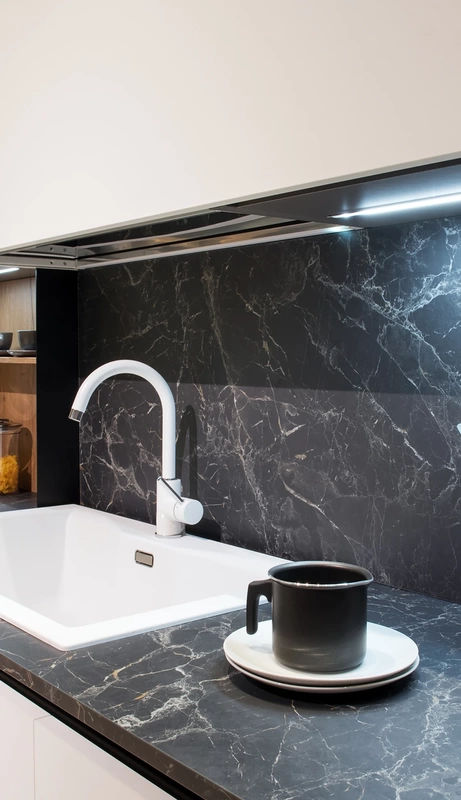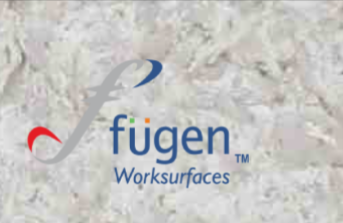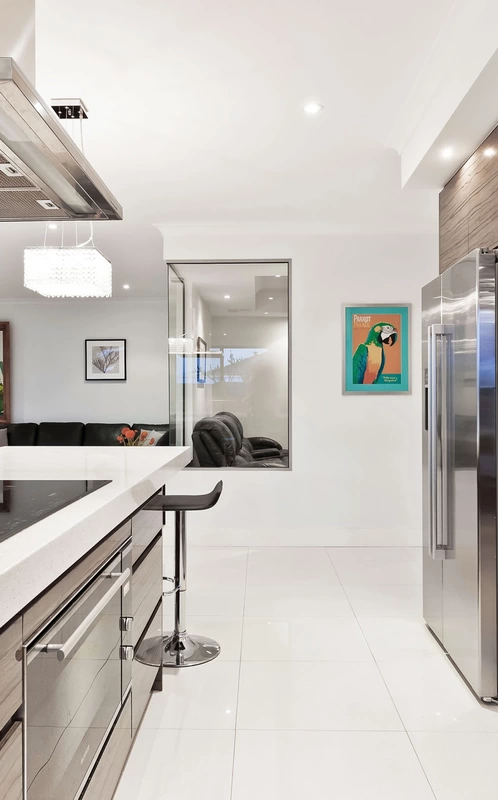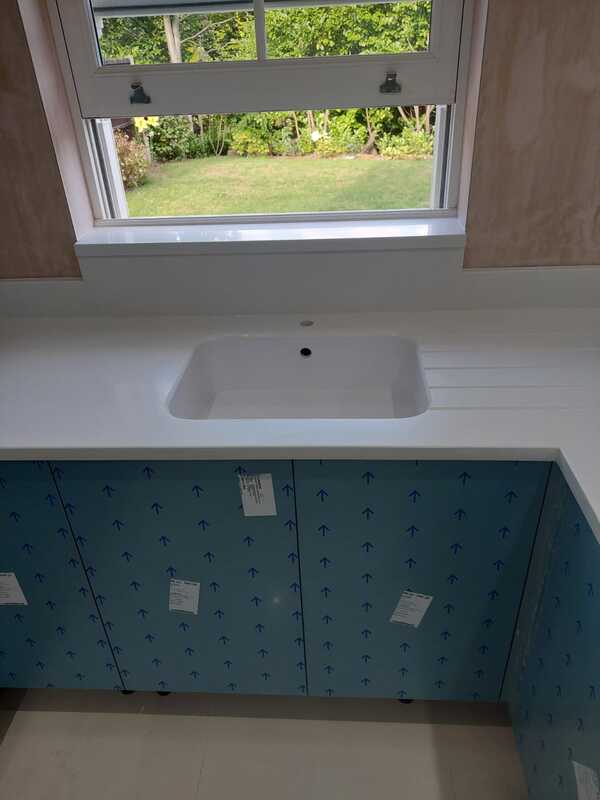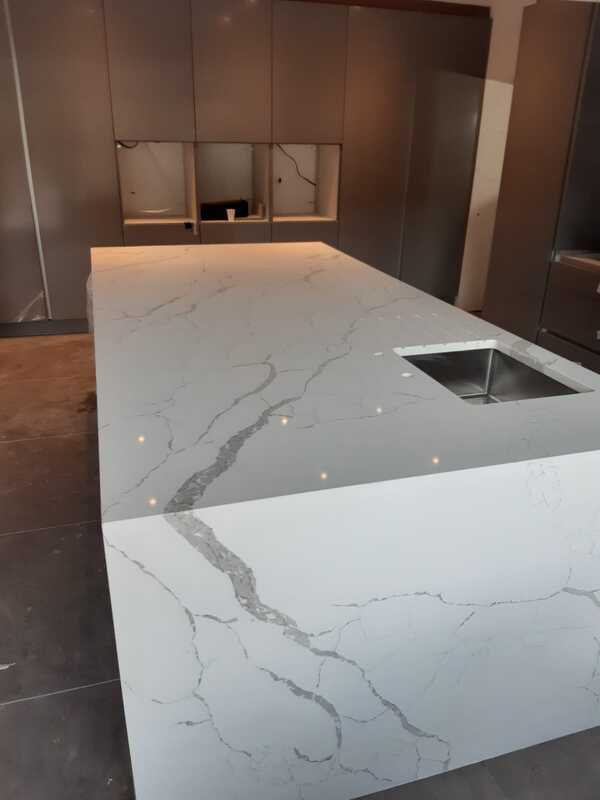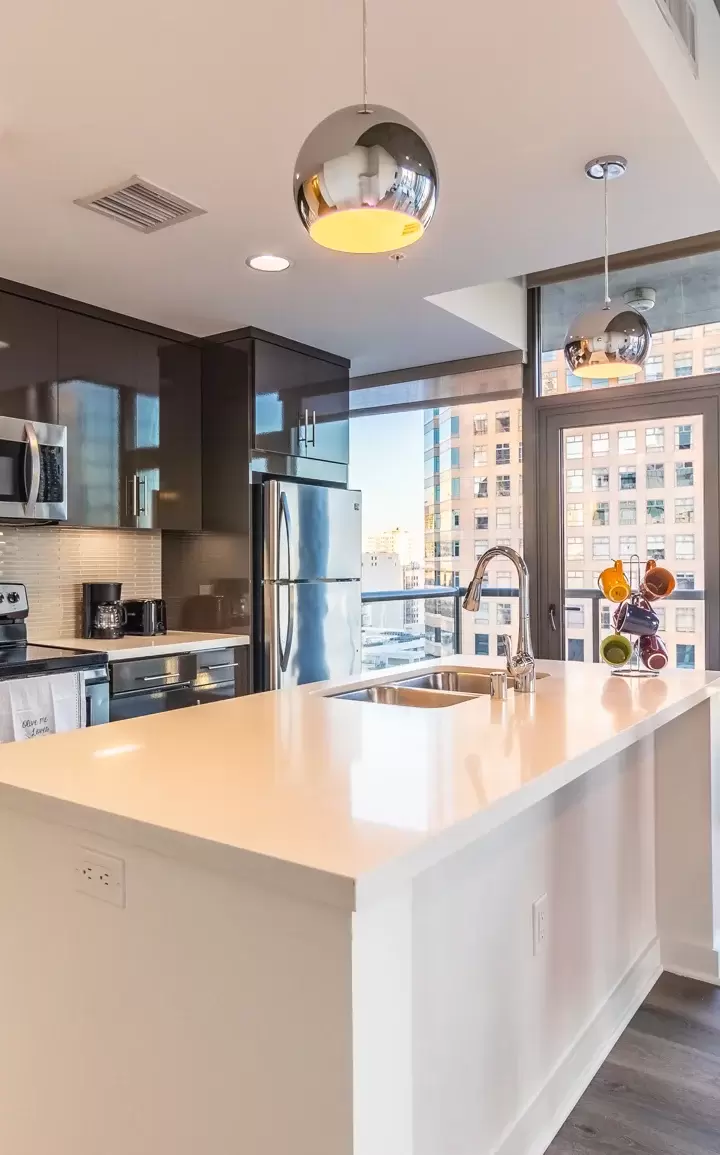Worktop Fabrication Nottingham - How We Make Your Kitchen Worktops
|
In the world of kitchen design and installation, precision and accuracy are crucial in achieving a perfect final product. This is where worktop fabrication comes into play. Worktop fabrication involves the cutting, shaping, and finishing of worktops to fit seamlessly into a kitchen space.
At its core, the process involves using specialised tools and machinery such as CNC machines and 3D laser scanners to create custom-made worktops. In this document, we will dive into the details of our worktop fabrication process at Nottingham Joinery and how it can result in a flawless end product of a precisely engineered worktop for your home or business. The Role of Flexijet 3D LaserOne of the key components in worktop fabrication is the use of a Flexijet 3D Laser, a state-of-the-art measuring tool that uses laser technology to capture precise measurements of a kitchen space. This device allows for accurate digital templates to be created, eliminating the need for manual measurements and minimising human error.
The Flexijet 3D Laser can measure every angle and contour of a kitchen with ease, making it an essential tool in the worktop fabrication process. By using this technology, kitchen fitters can ensure that worktops are cut to the exact specifications of a space, resulting in a flawless fit. CNC Cutting Machine: A Game-ChangerAfter the measurements have been taken and digital templates created using the Flexijet 3D Laser, the next step in the fabrication process is cutting. This is where a CNC machine comes into play. A CNC machine, short for Computer Numerical Control, uses computer software to control the cutting process, ensuring precise and accurate cuts.
Using a CNC machine not only saves time and resources but also guarantees consistency in the quality of worktops. With its advanced technology, a CNC machine can cut through various materials such as laminate, wood, or stone with ease, delivering an impeccable finish every time. Modern Fabrication TechnologyWith the help of modern technology, worktop fabrication has become an efficient and streamlined process. However, this does not diminish the importance of skilled labour in achieving a perfect end product.
Nottingham Joinery kitchen fitters play a vital role in the final stages of worktop fabrication. They are responsible for fitting and installing custom-made worktops into a kitchen space, ensuring that all measurements and cuts are accurate. Their expertise and attention to detail are crucial in achieving a flawless finish. Worktop Material SelectionWhen it comes to worktop fabrication, another crucial aspect is material selection. Worktops are available in a variety of materials such as granite, quartz, wood, and laminate. Each material has its unique properties and characteristics that can enhance the look and functionality of a kitchen.
For example, granite worktops offer durability and heat resistance, making them ideal for busy kitchens. On the other hand, wood worktops bring warmth and character to a space, while quartz worktops offer a sleek and modern look. Understanding the different material options and their strengths can help in making an informed decision when it comes to selecting the perfect worktop for your kitchen. Worktop DesigningOnce the material is selected, our team of designers will work with you to bring your vision to life. We use state-of-the-art software to create detailed 3D designs, giving you a realistic preview of your worktop before fabrication begins. Our designers are skilled at incorporating your ideas and preferences while also providing their expert insights on functionality, durability, and aesthetics.
Worktop Measurement and Template CreationAccuracy is crucial in the fabrication process, which is why we take precise measurements with our Flexijet 3D Laser of your space to ensure a perfect fit for your worktop. Our team will create a template based on these measurements, taking into account any cutouts for sinks or appliances. This step is essential as it allows us to identify any potential issues and make necessary adjustments before fabrication begins.
Cutting and FabricationUsing advanced CNC cutting equipment and techniques, our skilled fabricators will cut the chosen material to the exact specifications of your template. This process involves precise cutting, polishing, and finishing to achieve a flawless worktop. Our team follows strict quality control measures to ensure consistency and precision throughout this stage.
Quality ControlAt Nottingham Joinery, we take quality control seriously. Our team conducts a thorough inspection of the worktop at every stage of fabrication to ensure it meets our high standards. Any imperfections or discrepancies are immediately addressed, and only worktops that pass our rigorous quality checks move on to the final stage.
InstallationInstallation is the last step in our fabrication process, and it is just as crucial as the previous stages. Our installation team comprises experienced professionals who will carefully transport and install your worktop with precision and efficiency. With our attention to detail, we guarantee a flawless fit and finish for your worktop.
Finishing TouchesApart from material selection, finishing touches are also vital in the worktop fabrication process. This includes adding details such as edging, cutouts for sinks and cooktops, and applying a sealant to protect the worktop from stains and scratches.
The finishing touches not only serve a functional purpose but also enhance the overall aesthetic of a kitchen. With careful attention to detail, these final steps can transform a simple worktop into a stunning centrepiece of a kitchen. Maintenance and CareTo ensure the longevity of your worktops, it is essential to properly maintain and care for them. This includes regular cleaning and proper use of cutting boards to prevent scratches on the surface.
Different materials may require specific maintenance routines, so it is crucial to follow manufacturer's guidelines. With proper care, worktops can last for many years, making them a worthwhile investment in any kitchen. Contact UsIn conclusion, the worktop fabrication process involves using cutting-edge technology such as the Flexijet 3D Laser and CNC machines, along with skilled labor from experienced kitchen fitters. This combination results in custom-made worktops that fit seamlessly into a kitchen space, elevating the overall design and functionality of a kitchen. So, next time you step into your dream kitchen, take a moment to appreciate the precision and expertise that went into its fabrication. So, by ensuring every minute detail is taken care of from start to finish using advanced technology and skilled labour, we aim to deliver a flawless end product.
Remember, perfection is in the details and worktop fabrication is no exception. Get ready to create your perfect kitchen with our expert team of team of professionals at Nottingham Joinery. Frequently Asked Questions About Quartz WorktopsWhat is a worktop fabricator?A worktop fabricator is a skilled craftsman who specialises in designing, cutting, and installing custom worktops from various types of materials such as stone, granite, quartz, and marble. They follow a precise process that involves taking accurate measurements, creating a design to meet specific requirements, cutting the material with specialised tools, and polishing and finishing the worktop for installation. Their role requires not only technical skills in using fabrication tools but also an artistic eye for detail to ensure the final product is both functional and aesthetically appealing.
What is templating for worktops?Templating for worktops is a crucial step in the worktop fabrication process. It involves creating an exact model, or template, of the space where the countertop will be installed. This template includes precise measurements and details such as the position of the sink, hob, and any other cut-outs or specific features. The use of digital templating technology has become increasingly popular in recent years as it provides a high level of accuracy and reduces the likelihood of errors. The template is then used as a guide when cutting and preparing the worktop material, ensuring a perfect fit during installation. It is an essential step in custom worktop fabrication to ensure the end product meets the exact specifications and requirements of the client.
How long does worktop templating take?The duration of the worktop templating process can vary depending on several factors, including the complexity of the design, the size of the worktop, and the number of cut-outs required for fixtures like sinks and hobs. However, on average, templating typically takes between one to three hours. It's important to note that this time investment is crucial to ensure a perfect fit and finish during the installation process, contributing significantly to the longevity and functionality of your worktop.
How long do worktops take to fabricate?The fabrication process for worktops is a detailed and meticulous one, which means the duration can vary significantly depending on several factors. These factors include the material used, the complexity of the design, and the size of the worktop. On average, the fabrication process can range from a few days to several weeks. It is essential to remember that this process involves careful measurement, precise cutting, and detailed polishing to ensure a high-quality finish. Therefore, while it may require patience, the time invested in fabrication is crucial to achieving a durable, functional, and visually pleasing worktop.
Can you use worktops right after installation?After the installation of your worktop, it is best to wait for a brief period before using it to ensure the sealants and adhesives used during the installation process have fully set. This waiting period can vary based on the type of worktop material and the products used, but typically it's around 24-48 hours. After this time, you can start to use your worktop normally. Make sure to follow the specific care and maintenance instructions for your particular type of worktop to ensure its longevity and maintain its finish.
How long after templating are worktops fitted?After the templating process, the fabrication of the worktop begins, which can take anywhere from a few days to a few weeks, depending on the material and the complexity of the design. Once fabrication is complete, the fitting or installation of the worktop is scheduled. Typically, you can expect your worktop to be fitted approximately one to two weeks after the templating process, but this can vary based on the workload of the fabricator and the specifics of your project. It is advisable to discuss timelines with your fabricator to have a clear understanding of when your worktop will be installed.
How long does it take professionals to install worktops?The duration of the installation process can vary greatly depending on the size and complexity of the worktop, as well as the specific conditions of the installation site. In general, a professional team can install a standard worktop within a day. However, larger or more complex installations may take up to two days. This includes time for setting up, cleaning, and making necessary adjustments to ensure the worktop fits perfectly. It's important to keep in mind that while installation can be completed relatively quickly by professionals, it's the preparation, measurement, and fabrication stages that require more time and precision.
Nottingham Joinery - Your local Joiner
& Worktop Fabrication Specialist FREE Design Consultation and FREE Quotation Call Now on 0115-647-0250 |
|
